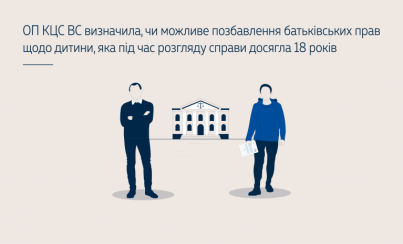Contact center of the Ukrainian Judiciary 044 207-35-46

The fact that the child has reached the age of majority while the court is considering the case of deprivation of parental rights cannot be an independent ground for dismissing the claim. Despite the fact that the child has reached the age of majority, the court must establish the validity or invalidity of the grounds for the claim to deprive the defendant of parental rights provided for in Article 164 of the Family Code of Ukraine and make a corresponding court decision.
This conclusion, which ensure the uniformity of case law, was reached by the Joint Chamber of the Civil Cassation Court of the Supreme Court.
In the circumstances of the case, the mother brought a lawsuit to the court to deprive her ex-husband of his parental rights. The claim is based on the fact that the father has withdrawn from the upbringing of his minor son, does not care for his health, does not communicate with the child and has not paid child support since it was imposed. The Children and Family Service submitted an opinion to the court on the appropriateness of depriving the defendant of his parental rights over the child.
At the time the court decision was rendered, the child had reached the age of majority.
The court of first instance, with which the court of appeal agreed, dismissed the claim to deprive the father of his parental rights, on the grounds that this was only possible in respect of a child under the age of 18 and that the plaintiff and the defendant's son had already reached the age of majority by the time the case was concluded. At the same time, the local court noted that if the decision had been taken before the child reached the age of majority, all the grounds provided by law for depriving the defendant of his parental rights would have been present.
The Joint Chamber of the Civil Cassation Court of the Supreme Court overturned the above judgments and remitted the case to the court of first instance for a new trial, reaching the following legal conclusions.
The Supreme Court stated that the fact that a child has reached the age of majority during the dispute and the adoption of the relevant court decision cannot affect the legal outcome of the court's resolution of the case, as the court must assess the facts of the fulfilment or non-fulfilment by the parents of their obligations towards the child in the period before the child reached the age of majority, which became the basis for filing the lawsuit.
The provisions of the Family Code of Ukraine and other legislative acts do not prohibit deprivation of parental rights over a son/daughter after the age of majority.
Upon reaching the age of majority, a person loses the legal status of a child in the sense of the law, but the family relationship between father/mother and son/daughter does not cease after the child reaches the age of majority, and they retain the legal relationship as parents and children. This also means that they have reciprocal personal non-property and property rights and obligations that last for life, and in some cases even after the death of one of them.
Therefore, even after a child has reached the age of majority, parents who have not been deprived of their parental rights in respect of such a child retain certain rights and obligations in relation to the child by virtue of the fact that they are related by blood. When a child reaches the age of majority, the parents acquire the right to receive support and care from their adult son/daughter and the corresponding obligations. Parents who have not been deprived of their parental rights are the legal heirs of their child.
Such a normative regulation of family relations between parents and adult sons/daughters is the embodiment of the moral foundations of society, according to which a father and mother who have properly fulfilled their duties towards their child over a long period of time (from birth to the child's majority, and in certain cases even after the child reaches the age of majority) are entitled to support from their adult sons/daughters, as well as to inheritance by right. Accordingly, depriving a mother or father of their parental rights in respect of their child, where it is established that they have failed to fulfil their parental responsibilities, renders them in particular ineligible for the right to support and inheritance in the future.
Thus, if a lawsuit is brought for the deprivation of parental rights in respect of a minor child, the court cannot dismiss such a lawsuit on the ground that the child has reached the age of majority during the consideration of the civil case and the resolution of the dispute on the merits.
The interpretation of para. 2, part 1, Art. 164 of the Family Code of Ukraine allows us to conclude that the evasion of parental responsibilities can be a reason for deprivation of parental rights only in case of guilty behaviour of parents, conscious neglect of their duties.
In resolving the dispute, the courts failed to find out what evidence showed that the defendant had deliberately avoided his parental responsibilities and, as a result, indicated the need to apply the extreme measure of depriving the defendant of his parental rights. Clarification of these circumstances is essential to the correct resolution of the case.
The Resolution of the Supreme Court of 29 January 2024 in case no. 185/9339/21 (proceedings no. 61-8918сво23) - https://reyestr.court.gov.ua/Review/117043621.
This and other legal positions of the Supreme Court can be found in the Database of Legal Positions of the Supreme Court - https://lpd.court.gov.ua.